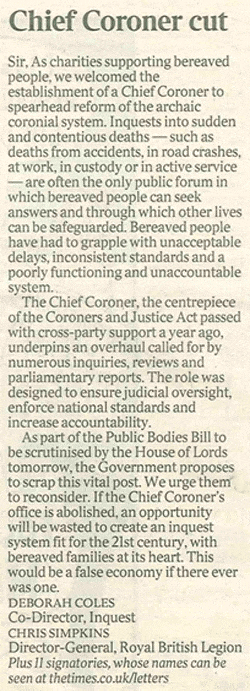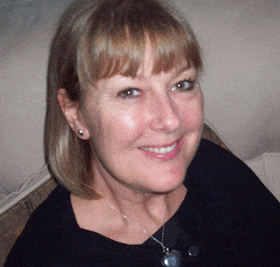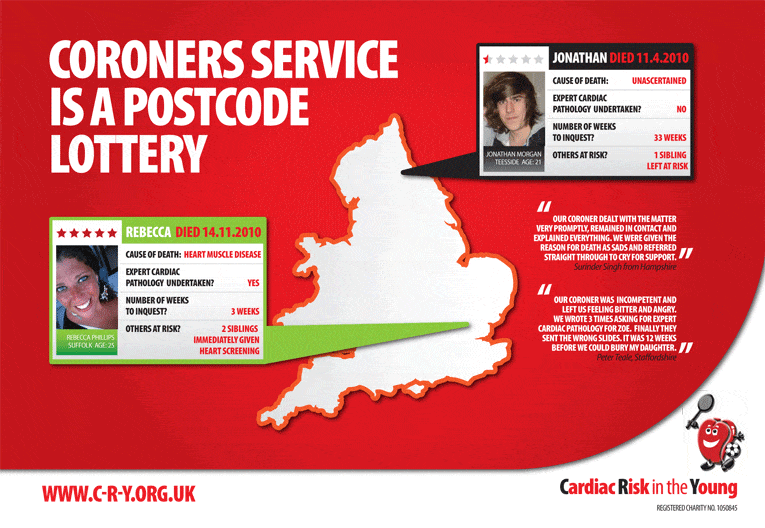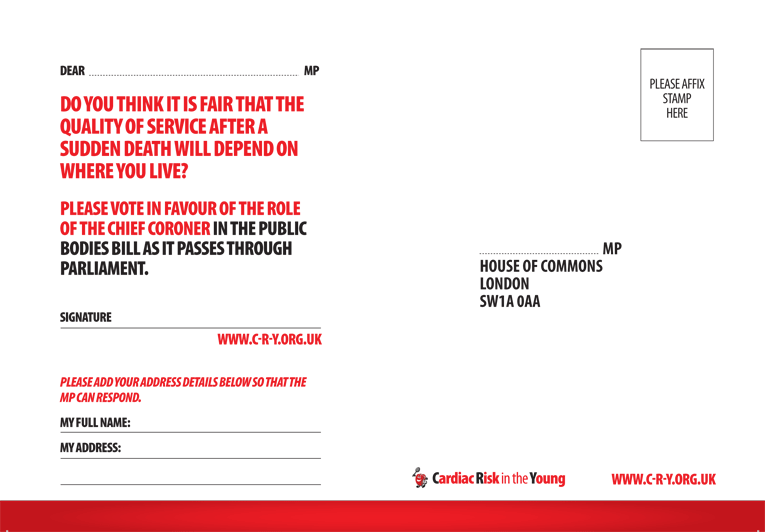A summary of CRY’s campaign to urge MPs to oppose the proposed abolition of the role of Chief Coroner for England and Wales.
There is grave concern about the government’s decision to scrap the proposed role of Chief Coroner for England and Wales. Expert opinion suggests that this ill-considered move will leave England and Wales with a diminished service unfit for the 21st century, with no financial advantage gained.
UPDATE – 25/07/2013
CRY welcomes the long awaited overhaul of the coroners’ service in England and Wales.
Alison Cox MBE, Chief Executive and Founder of CRY, comments on the proposed modernisation of the coroners’ service in England and Wales. [more]
Stockton mum backs move over chief coroner – Teesside Gazette, 24/11/2011
UPDATE – 23/11/2011
Stunning u-turn by Secretary of State Ken Clarke over the role of Chief Coroner
The prospect of again losing the battle in the House of Lords – who were so successful a year ago in blocking the Government’s decision to axe the role of Chief Coroner – has resulted in a last minute amendment establishing the role of Chief Coroner in the Public Bodies Bill. The British Legion has considerable influence in the House of Lords and some of you might have seen yesterday’s high impact full page article in the Sun appealing for support.
However the further fight is whether the option of retaining the Appeals Process can be won in today’s debate. We will keep you informed of the final outcome.
Further information is available on: http://www.telegraph.co.uk/news/uknews/defence/8907969/Military-inquests-Chief-Coroner-created-in-Coalition-climb-down.html
http://www.bbc.co.uk/news/uk-politics-15847352
UPDATE – 22/11/2011
The House of Lords will once again consider the Public Bodies Bill on Wednesday 23rd November. Baroness Finlay has again tabled an amendment to take the Chief Coroner and associated offices back out of this Bill and hopefully the House of Lords will back the new amendment as they did in December last year.
If successful, the issue will then return to the Commons where the Government will be under intense pressure to remove the Chief Coroner from the Public Bodies Bill as it would mean the whole of their Public Bodies Bill would fail if it stayed in. If this happened, the Government would be expected to put forward alternative proposals as set out by INQUEST and the Royal British Legion in their September 2011 proposal: http://inquest.gn.apc.org/pdf/briefings/INQUEST_October_2011_Briefing_on_Public_Bodies_Bill.pdf
However, first the Peers need to support Baroness Finlay’s amendment by voting for it (or abstaining from the vote). As the Government will be putting intense pressure on their Peers to vote against the amendment this is likely to be a much tighter vote than last year.
CRY statement – 26th October 2011
We are very sorry to report that despite everybody’s efforts and a robust debate in the House of Commons yesterday (October 25th), Conservative MP Andrew Percy’s amendment to remove the Chief Coroner from the Public Bodies Bill was defeated 235 – 287; i.e. a majority of only 52 votes, with a high number of abstentions.
This was in spite of months of fervent protests, including the British Legion, who received considerable media coverage by emphasising the need for a Chief Coroner for military inquests and published a poll of 2,000 people confirming that 69% say that appointing a Chief Coroner is a matter of principle not a question of cost; CRY, who had sent out 9,300 postcards over 10 weeks requesting support for the role of Chief Coroner; and a letter published yesterday in The Times supported by 18 leading charities.
The office of Chief Coroner has now been reinstated into the Public Bodies Bill and will again return to the House of Lords for their consideration. No date has yet been given as to when when this will be. We hope that the strength of feeling shown will encourage Peers to again challenge the government over this issue when it returns for ‘Lords Consideration of Commons Amendments’, and build on their previous inspirational success of last December (see Public Bodies Bill; Amendment 26; page 528 http://www.publications.parliament.uk/pa/ld201011/ldhansrd/lhan84.pdf).
The debate from the 25th October can be read at column 246:
http://www.publications.parliament.uk/pa/cm201011/cmhansrd/cm111025/debtext/111025-0003.htm
Ahead of October 25th’s debate on the Public Bodies Bill, 18 national charities wrote to The Times to urge MPs to vote to take the office of the Chief Coroner out of the Bill. The letter reads:
Charities supporting bereaved people will be watching MPs closely today. Two years ago we welcomed Parliament’s decision to establish a Chief Coroner. Now as part of the Public Bodies Bill before the House of Commons today, the Government proposes to dismantle this vital post.
Inquests into contentious or sudden deaths – in accidents, in road crashes, at work, through suicide, in custody or in the Armed Forces – are often the only public forum in which bereaved people can seek answers and other lives can be safeguarded. But they are beset with unacceptable delays, inconsistent standards of service.
The Chief Coroner, as the centrepiece of the Coroners and Justice Act passed with cross-party support in 2009, underpins a necessary overhaul. The role was designed to ensure judicial oversight, enforce national standards and increase accountability. The Chief Coroner would lead the development of a functioning system that could make a vital contribution to saving lives.
The proposals to dismantle the role and transfer certain responsibilities to others will not bring about the reform necessary to improve bereaved families’ experiences. Instead, the piecemeal measures will add further complexity and uncertainty to an already fragmented system.
We must not lose this opportunity to create an inquest system fit for the 21st Century with bereaved families at its heart. That is why we urge all MPs to support the amendment tabled by Conservative backbencher, Andrew Percy MP, to remove the Chief Coroner from the Bill.
Helen Shaw, Co-Director, INQUEST
Chris Simpkins, Director General, The Royal British Legion
Javed Khan, Chief Executive, Victim Support
Debbie Kerslake, Chief Executive, Cruse Bereavement Care
Pamela Dix, Executive Director, Disaster Action
Catherine Johnstone, Chief Executive, Samaritans
Alison Penny, Childhood Bereavement Network: National Children’s Bureau
Ann Chalmers, Chief Executive, Child Bereavement Charity
Mark Goldring CBE, Chief Executive, Mencap
Neal Long, Chief Executive, Sands
Angela Samata, Chair, Survivors of Bereavement by Suicide
Diana Youdale, Chief Executive, The Compassionate Friends
Peter Walsh, Chief Executive, Action against Medical Accidents (AvMA)
Stephanie Trotter OBE, President & Director, CO-Gas Safety
Cynthia Barlow, Chair, RoadPeace
Alison Cox MBE, Founder & Chief Executive, Cardiac Risk in the Young (CRY)
David Hines, Chairman, National Victims’ Association
Eve Henderson, Director & Co-founder, Support After Murder & Manslaughter Abroad
House of Commons Early Day Motion 2042 on the Chief Coroner
That this House believes the judicial position of the Chief Coroner would provide much needed national leadership for the coroners system, significantly improve the experience of bereaved families and operate a new appeals process; notes the support for a Chief Coroner from charities and organisations including the Royal British Legion (RBL), INQUEST, Victim Support and CRY; further notes that the RBL has stated that the Government’s alternative proposals will fail to meet the needs of bereaved armed forces families and that the creation of the Chief Coroner is essential to improving bereaved armed forces families’ experience of military inquests; and therefore calls on the Government to support bereaved families by leaving the Chief Coroner out of the Public Bodies Bill.
Please ask your MP to sign this motion.
CRY petition
Collect more petition signatures by downloading a paper copy of our petition and posting the collected signatures back to the CRY office. Please return any paper petitions to us ASAP!
Media
- Laura’s family in fight against cuts – The Northampton Chronicle & Echo, 8th August 2011
- Calls for ‘lengthy and archaic’ inquest system to be changed – The Observer, 8th May 2011
- Grieving mum calls for chief coroner rethink – Evening Star (Ipswich), 27th August 2011
- Teesside coroner Michael Sheffield faces fresh probe – Evening Gazette, 26th August 2011
- Alison Cox MBE, CRY Founder and Chief Executive, was interviewed about this issue by ePolitix
- Concern over coroner reform – ePolitix, 14th June 2011
- Comment: Don’t let chance for coronial reform slip away – politics.co.uk, 12th July 2011
- Relatives are waiting an average of more than 10 months for inquests. Grieving relatives are having to wait longer and longer to find out how their loved ones died. Neil MacFarlane reports on renewed calls for changes at the top of Teesside’s Inquest system.
- Teesside mum to front national campaign Sue Ainsworth, from Stockton, was left with unanswered questions after Teesside Coroner Michael Sheffield’s investigation into her son Jonathan Morgan’s death
UPDATE – 28/07/2011
CRY postcard campaign – support the role of Chief Coroner
We would very much like as many people as possible to help us by sending out our coroners’ postcard (pictured below) appealing to their MP for support for this role. Perhaps family and friends might also want to help? People do not have to be bereaved to send postcards to their MP to raise awareness of this issue and ask for their vote of support.
Cards can be sent anywhere in England and Wales but those sending them must only send them to THEIR OWN MP. All you need to do is enter your MP’s name, sign and put your own name and address and add a stamp! Hopefully you will get a response!
This card has been designed to be a very simple way to make a high impact and get our message over clearly.
Background
- The role of the Chief Coroner was created by the Coroners and Justice Act 2009, which the Ministry of Justice said aimed “to deliver more effective, transparent and responsive justice and coroner services for victims”. Provisions within the Act were commenced to allow the Chief Coroner to be appointed in January 2010.
- In October 2010, the new office of the Chief Coroner for England and Wales fell victim to the ‘bonfire of the quangos’. Note: The Chief Coroner role was never formally appointed and had not commenced by this time.
- In December 2010, the House of Lords overturned the government’s decision, which would have seen the scrapping of the Chief Coroner’s Office. Lords voted 277 to 165 to amend the Public Bodies Bill to preserve the Chief Coroner, as set out in the Coroners and Justice Act 2009.
- Spring 2011. The second Reading of this Bill is being heard on Tuesday July 12 when the Lords’ proposed changes to the Public Bodies Bill will be debated by MPs in the House of Commons. This gives us a small window of opportunity to campaign for the government to reconsider its decision to abolish the role of Chief Coroner for England and Wales.
How you can help
As well as signing our petition we are asking whether you would consider contacting your MP (whose details are on the internet at www.parliament.uk) and either: leaving a message for your MP; booking a visit with your MP; or writing a letter to your MP urgently requesting a review of this policy.
The key message is that the role of Chief Coroner is a vitally important position which would empower the Appeals Process; spearhead reform; ensure judicial oversight and enforce the national standards which will finally make our inquest system fit for the 21st century.
Please let us know if you contact your MP by any of the methods above, so that we can promote the overall response to our appeal.


Peter’s fitness instructor daughter, Zoe, was 23 years old when she died in her sleep on 15 September 2009.
“With sudden death, you don’t have the opportunity to pray for a child’s survival, have the chance to say goodbye or even to be there with them to hold their hand as they pass away“ said Peter Teale, Zoe’s father. “Zoe had an incredible zest for life and it has been absolutely devastating to have her taken away from us.
“What was also hard was the way that we were treated by the coroner. It took three requests to get Zoe’s heart released (you lose your powers of guardianship in a sudden death case) for specialist examination at CRY’s heart unit at the Royal Brompton, where it was found that Zoe had inherited a heart condition. It also took two months to bury my daughter, which was an intensely distressing experience”.

Sue Ainsworth’s 21 year old son, Jonathan, died suddenly in his sleep in April 2010. Jonathan had been out with friends the night before and because of his age, both the coroner and pathologist wrongly assumed that his death was probably due to drink and / or drugs. They admitted this at Jonathan’s inquest. This meant that proper investigations were not undertaken to ascertain the true cause of death.
“Jonathan was no different to any other 21 year old but I was shocked when the coroner and the pathologist just assumed that his death must be due to drink or drugs,” said Sue. “It was only after I spoke to CRY and fought for his test results – which were returned four months later – that it was revealed that he only had minimal alcohol and no drugs in his system.”
“We also found out that at Jonathan’s post mortem a heart defect was found which should have alerted the pathologist to a possible hereditary cardiac defect. Following this, I insisted that Jonathan’s sister, Rhiannon, was screened for heart defects although the fact that we do not know the true cause of Jonathan’s death makes this process harder.”
A cursory history of the background to efforts made in the last 150 years to reform the Coroner System
| 1860 | Parliamentary Select Committee Report made recommendations on coroner remuneration, election and method of summoning juries when it was agreed that “the coroner differs from all other judicial officers in that he initiates his own proceedings…the Committee are unwilling to deprive the coroner of the initiative” |
| 1879 | Parliamentary Select Committee Report took extensive evidence on the Scottish system for investigating deaths through Procurators Fiscal assisted by pathologists or other doctors |
| 1910 | Chalmers Report made recommendations |
| 1936 | Lloyd Report made recommendations and that the system had passed its sell by date |
| 1971 | Brodrick Report made recommendations; demanding “drastic reform of 17th century concepts.” In 1975, Home Secretary (Roy Jenkins) said no action was to be taken on the report |
| 1999 | Home Office issued a circular with a draft charter to be adopted by each coroner; there was no-one to enforce it |
| 2003 | Luce Report was made to update the system: His view was “During the last three-quarters of a century, the Government has twice commissioned reviews of these subjects, in 1936 and 1965. Very little happened in response to their reports. The services are showing the consequences of this neglect. We, and those whom we have consulted, hope that the inaction will not continue” |
| 2003 | Dame Janet Smith asked for a single unified service |
| 2004 | Home Office published a “position paper” qualifying the Luce and Shipman reports |
| 2006 | The Constitutional Affairs Committee had an inquiry and issued a report followed by the publication of a Coroners Bill and Draft Bereavement Charter |
| 2009 | Coroners and Justice Act 2009 received Royal Assent |
| Jun 2010 | Reviewed after a change in government |
| Jan 2011 | The Office of the Chief Coroner – one of the offices to be abolished under the Public Bodies Bill (introduced In the House of Lords) – itself removed from the Bill (thereby the House of Lords did not agree to the abolition of the Chief Coroner) |
| Feb 2011 | Public Bodies Bill to pass to the House of Commons |
Press Release
A leading heart charity that offers specialist bereavement services following the sudden death of young people from undiagnosed heart conditions, is warning that the Government’s plans to abolish a key part of the Coroners and Justice Act (2009) will have a devastating effect on thousands of families across England and Wales.
Cardiac Risk in the Young (CRY) has campaigned for over 15 years for greater recognition of the conditions that cause sudden death in young people and to ensure that these deaths are registered appropriately and correctly.
However, last summer (June 2010) the new Coalition Government announced its decision to axe the role of Chief Coroner and Medical Officer – which had previously been accepted as an essential part of a new, reformed Coroners Service for the 21st century; along with a National Charter and Code of Practice.
Whilst this controversial decision is apparently part of a major cost cutting exercise, expert opinion now suggests that this ill-considered economy will simply leave an unaccountable and unhelpful service, adding to the suffering of bereaved families at one of the most devastating and vulnerable times of their lives.
In response to the acute needs of bereaved families, CRY had already established (2007) a specialist laboratory at the world famous Royal Brompton Hospital, dedicated to ‘free fast-tracking’ of pathology referrals from Coroners where sudden cardiac death is suspected, to ensure that families receive a swift and accurate diagnosis about the tragic death. The CRY laboratories also identify hereditary abnormalities, which alert families to the immediate screening necessary to prevent further deaths.
Alison Cox MBE, Chief Executive and Founder of CRY comments; “Under the current system, coroners are not accountable as there is no Appeals System. There are many wonderful coroners who make enormous efforts to diminish the suffering of the bereaved by every available means, including seeking the necessary expert fast-track pathology for cases of sudden death in fit and healthy young people.
“However, there are still too many that do not understand the urgency or consider the impact on the family if they do not make a full and proper effort to investigate the cause of death. It is almost impossible under the current system to make these coroners accountable even though they catastrophically increase suffering of those under their care at this terrible time.
“At CRY, along with a number of other charities who work with bereaved families, parents and spouses, we know how critically important the role of the Chief Coroner is going to be in empowering the Appeals Process. Without anyone to oversee this ancient, judicial system it will be impossible to enforce national standards, leaving our current, antiquated inquest system unfit for the 21st century.”
Those who are suddenly confronting a tragedy need a Coroners Service that will help them understand the cause of death of the person who has died. Families must be kept informed and consulted and their feeling, wishes and expectations must be listened to.
Previous reports to Government dating form 1908 have consistently highlighted the need for change. This is not going to happen if the Coroner’s Service is to be left without the crucial leadership of a Chief Coroner to enforce national standards. The current post-code lottery of variation in the quality of service given will remain and could in some instances prove fatal.
Alison Cox adds; “In the past, the treatment of some parents bereaved through a young sudden cardiac death has been appalling. Many have had to wait months, or even years to find out a cause of death and their concerns have been treated with little respect. The chances of a poorly performing coroner being brought to account are remote.
“Together with our families, we have campaigned hard to raise awareness of the importance of the coroner’s service and the improvements that should be made. Now the abolition of the key position that will oversee the reforms that so many have so eagerly waited for, means that these reforms face an uncertain future.”
Fortunately, the Government’s proposed revisions to the Coroners and Justice Act (2009) met with vigorous opposition in the House of Lords on December 14th 2010, who thwarted its final passage through Parliament with a strong majority favouring retention of the Chief Coroner’s role. Consequently the Lords’ proposed revisions will be re-presented to Parliament in February 2011, giving CRY a window of opportunity to continue campaigning vigorously for Government to reconsider and raise awareness via the national media.
Kevan Jones MP (who is a long standing supporter of CRY) says: “The post of Chief Coroner is vital if we are to drive up standards in the coroners’ service, especially when dealing with cases of sudden cardiac death. I urge the Government to listen to the experts on this issue and reinstate the role a Chief Coroner to ensure the coroners’ service has the leadership it needs.”
CRY’s campaign to urge the government to re-think the proposed abolition of the Chief Coroner role has already seen CRY supporters contact more than 160 MPs and Lords to express their concerns:
Diane Abbott MP, Dave Anderson MP, Stuart Andrew MP, Ian Austin MP, Lord Bach, John Baron MP, Guto Bebb MP, Alan Beith MP, Richard Benyon MP, Crispin Blunt MP, Nick Boles MP, Ben Bradshaw MP, Tom Brake MP, Angie Bray MP, Kevin Brennan MP, James Brokenshire MP, Annette Brooke MP, Chris Bryant MP, Robert Buckland MP, Richard Burden MP, Andy Burnham MP, Simon Burns MP, Paul Burstow MP, Lorely Burt MP, Liam Byrne MP, Douglas Carswell MP, William Cash MP, Rehmar Chishti MP, James Clappison MP, Ken Clarke MP, Therese Coffey MP, Rosie Cooper MP, David Crausby MP, Ed Davey MP, David Davis MP, Jonathan Djanogly MP, Jim Dobbin MP, Frank Dobson MP, Stephen Dorrell MP, Nadine Dorries MP, Jim Dowd MP, Jack Dromey MP, Michael Dugher MP, Iain Duncan Smith MP, Clive Efford MP, Tobias Ellwood MP, Charlie Elphicke MP, George Eustice MP, Chris Evans MP, Lord Falconer, Michael Fallon MP, Robert Flello MP, Caroline Flint MP, Yvonne Fovargue MP, Liam Fox MP, Edward Garnier MP, Mark Garnier MP, David Gauke MP, Andrew George MP, Roger Godsiff MP, Zac Goldsmith MP, Helen Goodman MP, Michael Gove MP, Richard Graham MP, Helen Grant MP, Chris Grayling MP, Justine Greening MP, Ben Gummer MP, Fabian Hamilton MP, Harriet Harman MP, Richard Harrington MP, Rebecca Harris MP, Oliver Heald MP, John Healy MP, David Heath MP, John Hemming MP, Charles Hendry MP, Stephen Hepburn MP, Nick Herbert MP, Patricia Hewitt MP, Gerald Howarth MP, Earl Howe, Lindsay Hoyle MP, Jeremy Hunt MP, Margot James MP, Sian James MP, Bernard Jenkin MP, Alan Johnson MP, Gareth Johnson MP, Helen Jones MP, Tessa Jowell MP, Chris Kelly MP, Liz Kendall MP, Sadiq Khan MP, Kwasi Kwateng MP, Andrew Lansley MP, Andrea Leadsom MP, Philip Lee MP, Charlotte Leslie MP, Peter Lilley MP, Stephen Lloyd MP, Elfyn Llwyd MP, Jack Lopresti MP, Shabana Mahmood MP, Anne Main MP, Paul Maynard MP, Stephen McCabe MP, Lord McNally, Stephen McPartland MP, Alun Michael MP, David Miliband MP, Ann Milton MP, Andrew Mitchell MP, Grahame Morris MP, James Morris MP, Steven Mosley MP, Sheryll Murray MP, Robert Neill MP, Owen Paterson MP, Mike Penning MP, Claire Perry MP, Christopher Pincher MP, Daniel Poulter MP, Mark Prisk MP, John Pugh MP, Yasmin Qureshi MP, John Randall MP, Lord Reid, Emma Reynolds MP, Linda Riordan MP, Andrew Robathan MP, Dan Rogerson MP, David Ruffley MP, David Rutley MP, Grant Shapps MP, Virendra Sharma MP, Richard Shepherd MP, Chris Skidmore MP, Andy Slaughter MP, Owen Smith MP, Nicholas Soames MP, Peter Soulsby MP, Bob Stewart MP, Gisela Stuart MP, Julian Sturdy MP, Hugo Swire MP, Mark Tami MP, Emily Thornberry MP, David Tredinnick MP, Elizabeth Truss MP, Andrew Turner MP, Karl Turner MP, Derek Twigg MP, Andrew Tyrie MP, Ed Vaizey MP, Valerie Vaz MP, Charles Walker MP, Robert Walter MP, Steve Webb MP, James Wharton MP, Chris White MP, John Whittingdale MP, Gavin Williamson MP, Phil Wilson MP, Sarah Wollaston MP, Jeremy Wright MP
‘It is a false economy to abolish the chief coroner’ (interview from ePolitix)
The government cites ‘current economic conditions’ as the reason for abolishing the chief coroner. Alison Cox MBE, chief executive and founder of Cardiac Risk in the Young (CRY), tells ePolitix.com why in the end abolition will cost more.
You are a charity that raises awareness of young sudden cardiac death and sudden death syndrome and offers specialist bereavement services following the sudden death of young people from undiagnosed heart conditions. What is your experience of the current coroners’ system?
It is patchy. There are a considerable number of terrific coroners who go well beyond the call of duty in supporting bereaved families. These coroners become a legend with the family, who never forget how much they have been helped at the most terrible time of their lives. However, it is a postcode lottery. There are random districts that have poorly performing coroners who horribly exacerbate the grief of families by only giving them what is required by law – which is insufficient in regard to young sudden cardiac death. The dead cannot speak for themselves and the bereaved are often too distraught to do so.
The role of chief coroner was to oversee improvements in the inquest system – what problems do the families you support often encounter in the current system?
A coroner who only follows the line of duty as required within the current mandate is unlikely to refer the heart of the deceased person on for expert pathology. Consequently the bereaved family is not being given the chance to learn what their child/partner died from. As most sudden-death conditions of fit and healthy young (35 and under) people are genetic, not having the correct diagnosis of the cause of death means that other members of the family could be at risk of dying from the same condition. Not having expert cardiac pathology after a young sudden death could literally prove fatal to relatives of the person who has died.
Minister for justice, Jonathan Djanogly, has said the government does not believe that the new, additional funding the office of chief coroner would require is justifiable – how would you respond to this?
We believe that this is incorrect. The chief coroner would ensure judicial oversight; enforce national standards; increase accountability with an appeals system; ensure fewer unnecessary delays; and introduce transparency into the system. It would make the service fit for the 21st century. I do not see how they can justify NOT funding this role which could save further lives. What price can you put on that, particularly when the people saved are young and apparently fit and healthy?
The post of chief coroner was originally created to reduce the costs, both legal and administrative, of defective decision-making. Do you think that a failure to proceed with the appointment of a chief coroner is a false economy?
I passionately believe it is! Baroness Finlay of Llandaff’s address to the Lords on December 12, 2010 challenged the costs the government has assessed for this position which is in excess of £10m. Her review indicated that the costs would be closer to £500,000. Experts believe that it will actually be more costly to try and make the alterations the government is suggesting, which is also likely to produce an inferior service.
The chief coroner was going to provide a new appeals process, how important would this process be for the families you support?
It was hoped that an ongoing development as part of the new appeals process would be to give an opportunity to those who had experience of the system to feed back their comments on their experience. This feedback should include positive endorsement as well as any difficulties. Their appraisal would be extremely valuable for the ongoing process of upgrading the service to meet not only the needs of the state but also the needs of those families that are trying to cope with their tragedy.
The House of Lords removed the abolition of the role of chief coroner from the Public Bodies Bill – do you think it is possible this will not be re-instated when the bill makes its way through the House of Commons?
We are campaigning for the importance of the role of chief coroner to be recognised, and have a petition we are delivering to No10 on March 3. Please visit http://www.c-r-y.org.uk/coronersbillcampaign.htm to find out more and sign our petition.
The government says the weaknesses in the system can be addressed without the role of chief coroner being introduced – do you think this is possible?
No, I do not. Expert opinion suggests it will be a significantly diminished service and there will be no financial advantage gained. Previous reports to government dating from 1908 have consistently highlighted the need for change. The Coroners and Justice Act 2009, which aimed to deliver more effective and responsive justice and coroners services for victims, took over eight years, occupying most of the last decade to achieve cross-party support and pass through the House of Commons. I think the Bereavement Charter which sets out guidance for bereaved people, including their rights and roles, during coroner investigations and inquests will be at risk without a chief coroner to give the service the national leadership it deserves. I do not think it is widely understood how important the coroners’ service really is. Establishing the role of chief coroner was a crucial part of the Act, which is rendered hollow without it.







